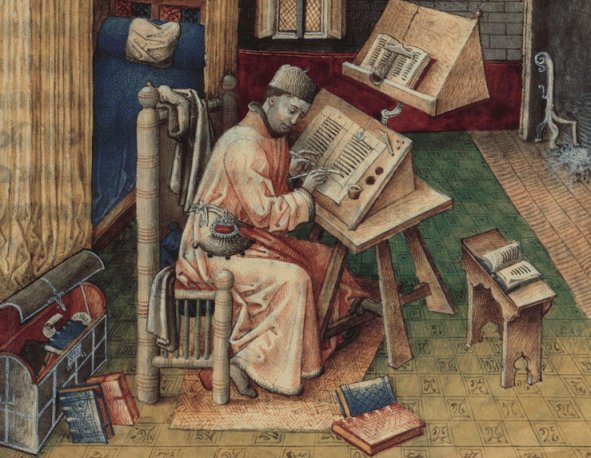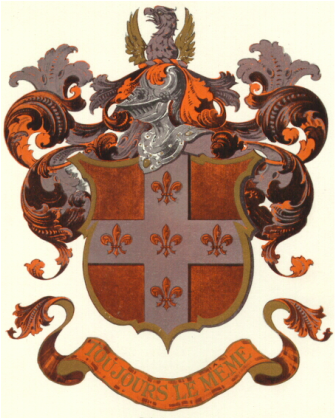|
Image: 15th century scribe found on MedievalBooks blog site of Erik Kwakkel, PhD. researcher at Leiden University in the Netherlands. Whichever way you choose to spell it, the Jewitt name found its way to England following the Norman Conquest of 1066. The name is said to derive from the surname of Jowett, a baptismal name which refers back to Julien with its noble Roman origins.
According to the website, HouseofNames.com, multitudes of spelling variations are a hallmark of Anglo Norman names. Most of these names evolved in the 11th and 12th century, when Normans introduced their own Norman French language into a country where Old and Middle English had been spoken. To add to the confusion, most people did not know how to read and write. These skills were primarily centered in the churches, where, with no spelling rules and two or more languages competing for dominance, medieval scribes were left to their own devices, spelling names and words according to sound, and using their own best judgement. As a result, names frequently appeared differently in the various documents in which they were recorded. Fast forward to the 21st century and believe it or not there is a website called FamilyTreeDNA that is here to solve the mystery of which spelling(s) of your name you are actually related to. It even has a "Jewett" Group Project going if you want to submit some of your saliva and find out the answer. I think of the medieval scribe who could never have imagined such a thing, as he labored alone in his scriptorium sounding out the words: Jewitt, Jewett, Jouett, Juet, Jowitt...
0 Comments
This image of our coat of arms illustrates what "gules on a cross argent and five fluer de lis of the field" actually looks like. The words come from the 11th century French system of heraldry which greatly influenced the terminology used in Britain and all over Western Europe. They are generally defined as follows:
Gules - the heraldic name of the tincture red. The term is probably derived from the Latin gula, which in Old French is found as gueule, i.e. the "red throat of an animal." Or it may be derived from the Arabic gule, a red rose. Others, again, have tried to find the origin in the Hebrew word gulade, which signifies red cloth. Argent - the tincture silver; comes from late Middle English denoting silver coins; Old French from the Latin argentum. Fleur-de-lis - the lily; an ancient symbol that came to signify saintliness or divine right; adopted by the French Monarchy in the 12th century as a symbol of the king's divinely approved right to rule. Research shows that the family name Jewitt is also of Norman (French) origin and that our earliest ancestors probably arrived in England around the Norman Conquest of 1066. Early Jewitt ancestry has been traced back to Henri de Juatt, a knight of the First Crusade 1096-1099, and Henry Jewet may well have inherited the coat of arms through which he was later granted his office of "forrester and parker." |
Archives
July 2018
Links to Related Sites Lincolnshire Wildlife Trust Rod Collins - Lincolnshire Thro' History, Life, Lens and Words The Old Palace Lincoln - Elegant Bed and Breakfast National Portrait Gallery - London College of Arms The Jewett Family of America History and Geneaology of the Jewitts of America Jowett Variations Marvinas Bay Lodge First Peoples of Canada |
Jewitt-Pennock-Foster and Cool-VanPelt Family History Copyright © 2015


 RSS Feed
RSS Feed